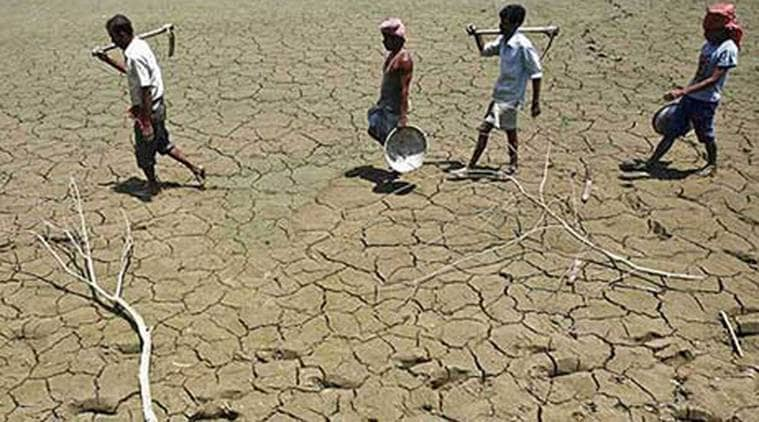Maharashtra Lok Sabha elections: Nationalism trumps drought in Marathwada
Written by Kavitha Iyer, Parthasarathi Biswas | Mumbai, Pune | Updated: May 24, 2019 2:46:41 pm
Across these regions, where mitigation measures to tackle a grave water and fodder scarcity had barely begun during the election campaign, BJP leaders had run a campaign almost entirely on issues of national security, the Pulwama attack and the Balakot airstrike.
 “The farmers’ anger was not decisive, nor was the anger of the Marathas,” Aurangabad-based columnist and writer Ganesh Mohite said. (Representational Image)
“The farmers’ anger was not decisive, nor was the anger of the Marathas,” Aurangabad-based columnist and writer Ganesh Mohite said. (Representational Image)
Shrugging off the impact of a crippling drought, anger at slow drought relief measures and years of poor price realisations for most major farm produce, rural Maharashtra appears to have re-elected the BJP-Shiv Sena combine to stunning victories in regions witnessing the worst agrarian distress.
The ruling alliance has won seven of the eight seats in Marathwada and all the eight seats in north Maharashtra, which is witnessing acute drought currently.
Across these regions, where mitigation measures to tackle a grave water and fodder scarcity had barely begun during the election campaign, BJP leaders had run a campaign almost entirely on issues of national security, the Pulwama attack and the Balakot airstrike.
NCP’s Ranajagjitsinh Patil, who lost from Osmanabad, said he’s at a loss to understand the mood of the electorate. Another NCP leader said, “The posturing of Narendra Modi as a strong leader of the nation has taken prominence in the minds of voters over rural distress. The trend is clear – they want a strong leader in Delhi who can protect the nation.”
Perhaps the most poignant comment came from Swabhimani Paksha leader Raju Shetti, one of Maharashtra’s foremost farmer leaders and sitting MP, who was defeated by Dhairyasheel Mane of Shiv Sena on Hatkanangle seat in Kolhapur, in western Maharashtra. “Farmers chose to vote on emotive issues rather than on issues that mattered to them directly. We have to rethink our strategies,” Shetti told The Indian Express.
Shetti has twice represented the seat, fighting on issues of cane payment and milk prices. This is the first time he has tasted defeat in his home constituency.
“The farmers’ anger was not decisive, nor was the anger of the Marathas,” Aurangabad-based columnist and writer Ganesh Mohite said. “Instead, the micro-level caste and community strategies worked — the Vanchit Bahujan Aghadi has consolidated the Dalit and Muslim votes in Marathwada away from the Congress-NCP. Meanwhile, the anger in the Maratha community over the non-implementation of reservations led to a fractured Maratha vote.”
Mohite cited one of the many Whatsapp messages being shared on Maratha groups during the campaign about which Maratha the Nanded’s voters should pick – Ashok Chavan or Pratap Patil Chikhalikar, who belongs to the ‘96 kuli’ blue-blooded clans. Chavan was among the most prominent Congress-NCP leaders to be defeated by a largely rural electorate.
Of the seven seats in Vidarbha, the saffron alliance won five. Over the last four years, wholesale prices of crops, including soyabean, chana and tur, had traded much below the government-notified Minimum Support Price (MSP). In Akola for example, most farmers sold their chana crop at Rs 2,900 per quintal as against the MSP of Rs 4,620 per quintal.
Mohite cited one of the many Whatsapp messages being shared on Maratha groups during the campaign about which Maratha the Nanded’s voters should pick – Ashok Chavan or Pratap Patil Chikhalikar, who belongs to the ‘96 kuli’ blue-blooded clans. Chavan was among the most prominent Congress-NCP leaders to be defeated by a largely rural electorate.
Of the seven seats in Vidarbha, the saffron alliance won five. Over the last four years, wholesale prices of crops, including soyabean, chana and tur, had traded much below the government-notified Minimum Support Price (MSP). In Akola for example, most farmers sold their chana crop at Rs 2,900 per quintal as against the MSP of Rs 4,620 per quintal.
Mohite cited one of the many Whatsapp messages being shared on Maratha groups during the campaign about which Maratha the Nanded’s voters should pick – Ashok Chavan or Pratap Patil Chikhalikar, who belongs to the ‘96 kuli’ blue-blooded clans. Chavan was among the most prominent Congress-NCP leaders to be defeated by a largely rural electorate.
Of the seven seats in Vidarbha, the saffron alliance won five. Over the last four years, wholesale prices of crops, including soyabean, chana and tur, had traded much below the government-notified Minimum Support Price (MSP). In Akola for example, most farmers sold their chana crop at Rs 2,900 per quintal as against the MSP of Rs 4,620 per quintal.
Slow pace of government procurement had also irked voters. In many areas, farmers faced the double whammy of low produce in the last kharif season and no rabi crop due to moisture stress. Top contenders in the NCP and Congress had made these their main issues.
![We The People ! [ Daily News ]](https://blogger.googleusercontent.com/img/b/R29vZ2xl/AVvXsEi7PNflLYO2id_pgKevcLALLVghNAUKitpe3VQpV5fJatRfWJCD5mtlJzat6fUgV7ymgMyAe1yNdVgoDeLbqc_5gXJpSzYE50pYDire_RBxd0JWLL96a-4NaYWD4QJ3EAFuXN6gNo1L5gs/s1600/LogoMakr_5zKJMi.png)












No comments:
Post a Comment